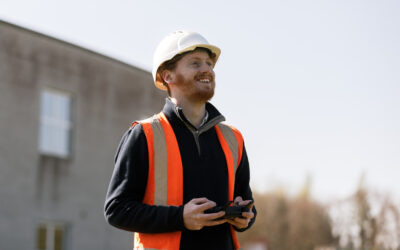AIDAN PRIESTLEY gets the latest on modern construction skills from Damien Henehan, Assistant Principal of the Construction and Green Skills Unit at the Department of Further and Higher Education, Research, Innovation and Science
In the rapidly evolving world of construction, the need for innovative skills and modern methods has never been more pressing.
The Construction and Green Skills Unit at the Department of Further and Higher Education, Research, Innovation and Science, is at the forefront of this transformation.
Damien Henehan, Assistant Principal in the Unit, provides insights into the evolving landscape of construction skills, the importance of modern methods of construction (MMC), and the initiatives aimed at equipping the industry for future challenges.
“One of the big things is the adoption of modern methods of construction,” he says. MMC is an umbrella term for innovative construction techniques, both off-site and on-site.
While some forms of MMC have existed before, the focus now is on significantly increasing their adoption.
“MMC is expected to create a whole new range of career opportunities in the sector,” he adds.
This shift necessitates specialist training to meet the emerging skills requirements, and it’s anticipated to reduce the projected increase in labour demand.
The need for skilled workers in the construction sector is critical. A 2022 report highlighted the requirement for 51,000 new entrants by the end of the decade, encompassing skilled and semi-skilled roles.
This projection is being updated to take account of MMC and will be available shortly.
MMC is seen as a strategic approach to address this demand by lessening the number of workers needed for construction projects.
“We’re working with partners to promote the adoption of MMC, including the Department of Enterprise, Trade and Employment, the Department of Housing, SOLAS, Skillnet and the National Construction Training Campus under Laois-Offaly ETB,” he says, describing the collaborative approach to encouraging wider adoption of MMC.
The Department leads several initiatives to support MMC and bridge the skills gap.
These include the development of the National Demonstration Park for MMC at the National Construction Training Campus and supporting Skillnet in creating an MMC national platform, a digital repository for all things MMC.
Additionally, an MMC action plan is being developed in response to the recent Expert Group on Future Skills Needs (EGFSN) report, focusing on the skills requirements for MMC in the coming years.
There’s a strong potential for MMC to change perceptions about the construction industry, particularly in addressing existing perceived barriers of entry for women.
Damien shares insights from a research project conducted by the Careers in Construction Working Group, which revealed that construction is often perceived as solely on-site and suitable only for men.
“MMC can broaden the appeal of construction roles,” he says. The digitisation of processes, skills like Building Information Modelling (BIM) and Design for Manufacture and Assembly (DFMA), and structured off-site manufacturing environments make the industry more attractive to a diverse workforce.
To tackle stereotypes and promote careers in construction, the Department launched the Building Heroes campaign. This social media initiative features 12 individuals working in construction, including mentors, trainees, graduates and apprentices.
They share their day-to-day experiences on platforms like TikTok and Instagram, providing a peer-to-peer perspective. The with over three million impressions since it launched in April, effectively showcasing the diverse opportunities within the construction sector.
The Careers in Construction Working Group developed an action plan with 20 actions focusing on structural changes, training, upskilling, and promotional activities.
This plan includes apprenticeship fairs and construction fairs nationwide, highlighting women in construction and the various career paths available.
“We need to highlight all the great opportunities in the construction sector and attract more women into the industry,” he says.
The relationship between the Department and construction partners is crucial. Nearly 45 per cent of apprenticeships available are in construction or related fields.
New consortia are being developed to create more apprenticeships, and industry groups are actively involved in identifying skills gaps.
The regional skills fora, part of the Department, engages with local industry groups to ensure training meets current needs.
“It’s a ground-up approach. The Department doesn’t decide where the need is, it comes from industry.”
Achieving government targets, whether for housing or the National Development Plan, requires the right number of workers with the appropriate skill sets.
Accessible courses in MMC and other areas are essential for training people in these needed skills. Attracting more people into the sector is equally important.
“With increasing housing targets, we need more workers, so we need to entice more people into the sector,” he says.
The Department and industry are working together to promote the construction sector’s diverse opportunities and highlight the excellent work being done.
Through strategic initiatives, partnerships, and promotional campaigns, the Department aims to equip the industry with the necessary skills and attract a diverse workforce, ensuring it meets future challenges head-on.
“There is a lot going on,” he says, “it’s not just for the Department to promote careers in construction, the industry is playing a large role. We have a good and positive relationship and we have to work together really for the future of skills in the industry.”








